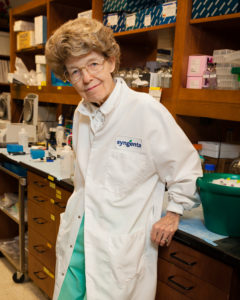 One of the awardees of the Golden Goose Award this year is Dr. Mary-Dell Chilton. I had the opportunity to interview her during a Syngenta Media Event in 2006. You can find that interview here.
One of the awardees of the Golden Goose Award this year is Dr. Mary-Dell Chilton. I had the opportunity to interview her during a Syngenta Media Event in 2006. You can find that interview here.
Here is an overview of the work Dr. Chilton is well-known for.
Using millions of years-old bacteria to genetically modify plants resistant to pests. Awardee: Mary-Dell Chilton – Syngenta .
In the 1970s, scientists were trying to uncover whether bacteria’s ability to repair their own DNA could also hijack plant growth — a survival strategy which, while savvy, threatened agricultural crops. Determined to find the answer, Mary-Dell Chilton analyzed data at her kitchen table after her kids had gone to bed. To her surprise, she discovered that bacteria could transfer their DNA into plants. The technique she eventually developed based on the bacteria’s natural abilities, known as Agrobacterium-mediated transformation (AMT), is now widely adopted by U.S. corn, soybean and cotton farmers.
The Golden Goose Award, which celebrates federally funded research that sounds silly, but ultimately benefits society, has selected five researchers across the fields of biology, agriculture and genomics for their unexpected breakthroughs as 2023 awardees. On September 27, 2023, the American Association for the Advancement of Science (AAAS), the world’s largest multidisciplinary scientific society, co-hosted the 12th annual Golden Goose Award ceremony with the Association of American Universities, a founding member of the Golden Goose Award, at the Library of Congress to celebrate the awardees’ achievements. You can find the video of the presentation on YouTube.
You can see the full news release here. (pdf)
